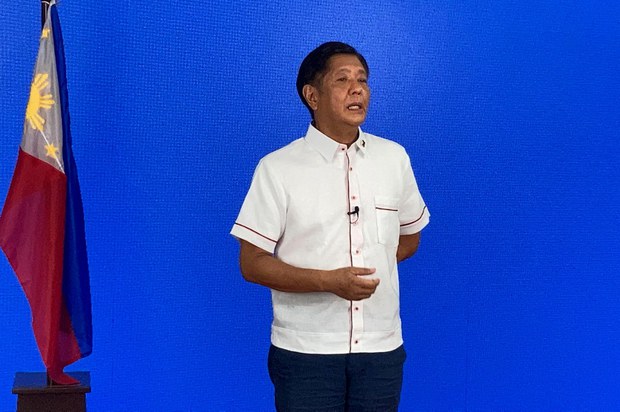Philippines’ Marcos will likely seek closer ties with Beijing: analysts
2022.05.10
 Ferdinand Marcos Jr., a Philippine presidential candidate and son of the late dictator Ferdinand Marcos Sr., speaks to the members of the media at his party headquarters in Manila, May 9, 2022.
Ferdinand Marcos Jr., a Philippine presidential candidate and son of the late dictator Ferdinand Marcos Sr., speaks to the members of the media at his party headquarters in Manila, May 9, 2022.
Ferdinand Marcos Jr., the son of the late Filipino dictator and presumed winner of this week’s Philippine presidential election in a landslide, will likely seek to turn the country to an ally of China, despite lingering anti-Beijing sentiment, analysts said.
“Bongbong” Marcos garnered more than 30.8 million votes by an unofficial count on Monday, and looks likely to take office in June.
Sara Duterte-Carpio, daughter of incumbent President Rodrigo Duterte, is expected to serve as Marcos’ vice president.
Marcos has already said he wants to pursue closer ties with China, including disregarding a 2016 ruling from The Hague that invalidated China’s massive territorial claims to the South China Sea.
Marcos has sought to distance himself from the ruling, which has been rejected by the Chinese Communist Party (CCP) in Beijing, and said he would likely continue to develop Duterte’s policy of closer ties with China.
Marcos’ election is a milestone in the political life of the Philippines, according to Zhuang Jiaying, associate professor of politics at Singapore’s National University.
During Marcos’ presidential campaign, there was also a campaign of harassment targeting supporters of rival candidates that raised questions “about whether democracy is taking a backward step, and whether [Marcos] will continue the current wave of authoritarian leadership,” Zhuan told the Mandarin Service of Radio Free Asia (RFA).
“[Marcos’] comments seem to favor a more pro-China stance, but whether those ideas can be realized in terms of policy is another matter,” Zhuang said. “When Duterte came to power, China promised a lot of investment, but it didn’t live up to expectations.”
“That gap caused disappointment in the Philippines, whose defense and security forces have become more suspicious of China because of its unrelenting pressure regarding the South China Sea dispute,” he said. “Even if Marcos himself wants a good relationship with China, he will meet with a certain amount of doubt and resistance.”
US ties run deep
Jeremy Chiang, of the Taiwan-Asia Exchange Foundation, said there had been a certain amount of popular support for the Marcos regime among Filipinos, despite the former dictator’s ouster by a peaceful “People-Power” revolution in 1986.
“When Marcos fell, not all Filipinos opposed him,” Chiang said. “In particular, the Marcos family had a positive image in their political heartland, and also in the popular imagination, and some still miss being part of a strong nation and economy at that time.”
“This image has been fed to young people via social media, so young people have a fairly good impression of Marcos,” he said.
It could be hard, he said, for Marcos to wean his country off military and security reliance on the United States.
“Military cooperation between the Philippines and the United States has evolved into a long-term strategy, with many people in the Philippines military and diplomatic service cherishing that relationship,” Chiang said.
“That kind of relationship with such a solid foundation was hard to shake off during Duterte’s term, despite the fact that China had [offered] more financial resources and aid programs,” he said.
Analysts have also cited anti-Chinese government sentiment among much of the Philippine population who see their fishermen’s livelihoods being threatened and lives being endangered by alleged harassment on the part of Chinese navy and coast guard ships.
Manila is Washington’s biggest ally in Southeast Asia, where an increasingly assertive China is encroaching on other claimant nations’ exclusive economic zones in the disputed South China Sea.
During his term, Duterte tested the U.S.-Philippines relationship, threatening to drop one of many bilateral security agreements and vowing never to set foot in the United States while president.
Domestically, the Philippine economy is just recovering after being in one of the world’s longest lockdowns due to the COVID-19 pandemic.
“Marcos might well try to revive Duterte’s early outreach to Beijing, but he is unlikely to toss the U.S. alliance overboard as part of the effort,” Greg Poling, a Southeast Asia analyst at the Center for Strategic and International Studies (CSIS), a Washington-based think-tank, said in an article published Monday.
“There will be rough patches for the alliance to manage. But they must be managed. In the face of a revisionist China, the United States’ oldest Asian alliance is more vital than ever before, regardless of who Filipinos (or Americans) choose as their president.”
This report was produced by the Mandarin Service of Radio Free Asia, the parent company of BenarNews.







